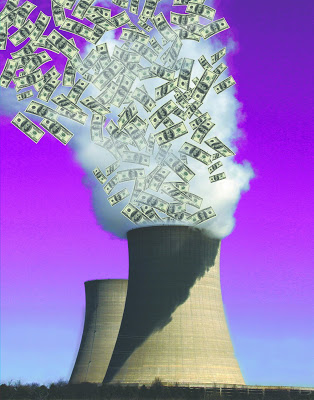Who pays the piper?
BP’s nuclear-powered liability cap
By Harvey Wasserman / The Rag Blog / May 23, 2010
As BP destroys our priceless planet, its lawyers gear up to save the company from paying for the damage. The same will happen — only worse — with the next atomic reactor disaster.
By law, BP may be liable for only $75 million of the harm done by the Deepwater Horizon.
Ask yourself why the federal government would adopt legislation that limits the liability of an oil driller for the damage it does to us all.
Ask the same question — on another order of magnitude — about nuclear power plants.
Some lawmakers have tried to raise this cap so BP could be made to pay for the wounds they have not yet stopped inflicting.
By any calculation, BP did more than $75 million in harm during the first hour of this undersea gusher. That sum won’t begin to cover even the legal fees, let alone the tangible damage to our only home.
But “free market” Republicans have resisted raising the limit. So BP will walk away virtually scot-free. All this will be tax deductible. So will the millions they’ll spend changing the name of the company, and dumping all those pathetic “Beyond Petroleum” pamphlets.
Now imagine a melt-down alongside the blow-out. See the Deepwater Horizon as a nuclear power plant. Think of the rickety Grand Gulf, a bit to the north, or the two decaying reactors at South Texas, a ways to the west.
Imagine that apocalyptic plume of oil ravaging our seas as an airborne radioactive cloud.
Feel it pouring like Chernobyl over the south coast, enveloping all of Florida, blowing with the shifts of the winds up over the southeast, irradiating Atlanta, then Nashville, then New Orleans, then Houston, all through Mexico and the north coast of South America, the Caribbean, then around again across Florida, through the Atlantic and all over Europe, then around the globe two or three times more.
The instigators of such a nightmare are currently on the hook for a maximum of $11 billion. Ask yourself why the federal government would limit the liability of a reactor owner for the damage it imposes on the public.
There’s a clear historic answer: In the 1950s, when the bomb-making Atomic Energy Commission wanted a civilian PR front, it asked the private utility industry to build commercial reactors. The electric companies refused, fearing that a melt-down could cost them everything.
So Congress passed the 1957 Price-Anderson Act, limiting a reactor owner’s liability to a paltry $560 million. They promised that private insurers would soon take up the risk.
A half-century later, taxpayers — and victims — are still on the hook. The feds have raised the liability limit to an utterly inadequate $11 billion.
A melted reactor today would do that much harm in the first hour. By any sane calculation, the non-radioactive Deepwater Horizon has long since done more.
According to the comprehensive study just published by the New York Academy of Sciences, the 1986 explosion at Chernobyl has killed some 985,000 people. The governments of Belarus and Ukraine estimate more than $500 billion in damages just to their countries alone.
Reactor advocates say with a corporate sneer that no such accident is possible in the United States. That’s exactly what those bumbling petro-criminals said before they erupted this gusher.
The current “Climate Bill” would use billions of your taxpayer dollars to fund new nukes all rigged up with all those ancient liability caps. Like Deepwater Horizon, the owners of these “advanced” reactors not yet built will be liable for virtually nothing.
Before tomorrow’s radioactive cloud follows today’s oil-soaked plume… before the next melt-down follows this blow-out… we need a green-powered Earth.
We have no choice. Our economy, our planet, our bodies cannot handle more public-funded corporate-imposed suicide.
[Harvey Wasserman’s Solartopia! Our Green-Powered Earth, is at www.harveywasserman.com. He is senior advisor to Greenpeace USA and senior editor of www.freepress.org, where this article also appears.]




















Shareholders should be liable. This is in the billions to trillion level(s)!
mps
Why should BP be held to a different standard than other large public companies? AIG, GM and Chrysler, autoworker unions and their pension plans, Fanny and Freddy, Goldman, lender banks, etc. In each of these cases, the companies found themselves in financial hotwater because of the consequences of bad choices, bad timing, greed, and bad luck. And the feds bailed them out. I was on the record against any and all bailouts. Let them fail. But, that ship has already sailed.
To hear you rag bloggers, somehow BP should be held to a different standard. The feds stepped in to GM and spared their unions and union pensions while completely screwing the bond holders. I didnt hear any rag bloggers calling for the arrest of the head of GM or the autoworkers unions.
In fact the feds created the “cash for clunkers” program to help revive the automakers with federal dollars on top of billions in direct loans and debt forgiveness. Perhaps the feds can come up with a “cash for tarballs” program to help cover any expenses for BP due to the spill.
It must be nice to live in a world where you can just make up new standards when it suits your political and environmental agenda.
Harvey,
Let’s hope that we don’t have to do that Nuke thing all over again, however I have my “occupation” boots handy.
re: BP. Probably won’t have to spend all of that 75 million, there is a federal fund that BP can hook into that covers oil spills. Adamas the rig was insured. By whom you ask? By AIG the insurance company we own and so all will be paid for by Uncle Sugar with our money…could it be different.